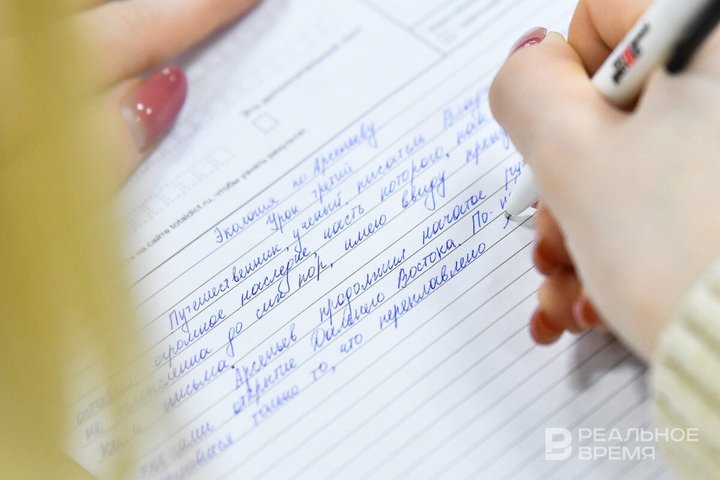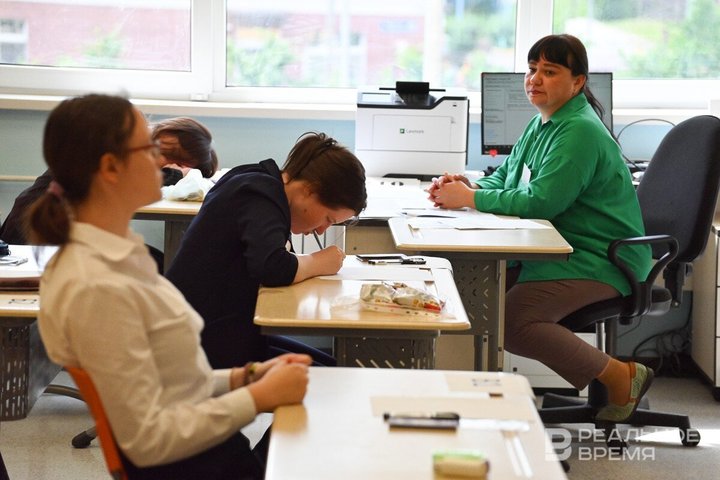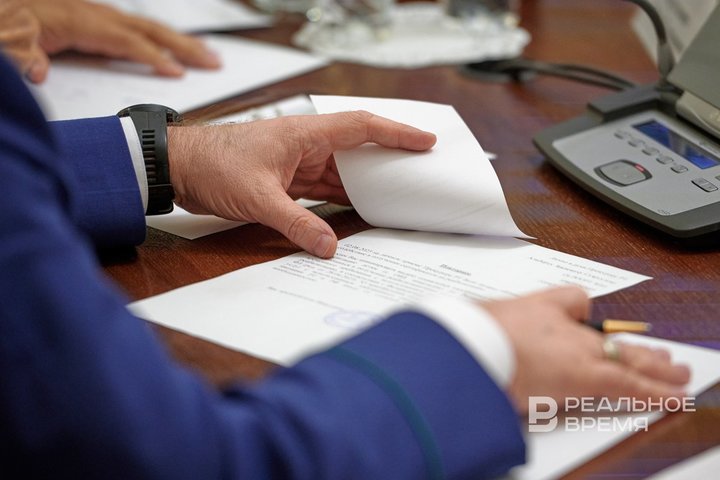Higher quality of services, exit of specialists from the market: what licensing tutors will lead to
Parents and tutors about an initiative of the State Council of Tatarstan

The illegal turnover of tutoring in Tatarstan amounted to almost a billion rubles. Due to this, at the recent meeting of the 6th State Council, its deputies called for licensing this activity. However, the opinions of parents and tutors themselves interviewed by Realnoe Vremya on this matter are ambiguous: some believe that such an idea will lead to a better quality of services, others claim that many specialists will simply leave the market. Read more about the pros and cons of the initiative in a report of Realnoe Vremya.
“A teacher before lunch, a tutor — after lunch”
The need to license the activities of tutors was discussed at the beginning of July in the State Council of Tatarstan. This proposal was made by deputies Khafiz Mirgalimov and Fadbir Safin.
“A huge illegal market for tutoring has formed. By to our calculations, the turnover in Tatarstan alone is about a billion rubles... Before lunch, there is a teacher, after lunch, there are tutors. They need to be licensed,” the colleagues provided some evidence.
As for the teachers themselves, 67% of teachers consider tutoring necessary for successful studying and passing exams. These results were shown by a study of the Dnevnik.ru platform. A similar point of view is shared by 51% of students and their parents.

A significant share of teachers (37%) offer individual lessons with their students after class Among parents, 55.4% are convinced that the school curriculum is not enough for successful studies. And according to 40% of students, classes with a tutor help them feel more confident and ready to study.
Development Director of Dnevnik.ru Yury Boyko emphasised that teachers complain about numerous extracurricular activities that distract students from the educational process. Parents note that the volume of the school curriculum is too large, which makes it difficult to fully learnt the material in class. In an interview with Rossiyskaya Gazeta, head of Russia’s education watchdog Anzor Muzayev, noted that preparation for exams should begin in year one, and not several months before.
“Many will continue to work unofficially”
Realnoe Vremya interviewed tutors to find out how they feel about the idea of licensing their activities. All respondents came to the same conclusion: prices for their services will rise, and clients may begin to abandon them.
“Salaries are negligible”

In her opinion, licensing tutors will lead to the exit of many specialists from private practice to online schools, and some will have to leave the profession altogether:
“Tutors will increase the price for the service; this is not particularly profitable for parents. Online schools win in this regard in terms of pricing. Therefore, tutors will either work at a loss (not all, but there will be some) or will go to online schools. Those who have managed to make a good name will not be particularly worried and will not like it, but specifically this will not be a reason for them to leave this industry.”
Gazizullina emphasised that this initiative has its advantages, since specialists will be able to insure themselves against many problems. However, for the comfortable work of tutors and the stability of the market, it is necessary to build licensing terms correctly.
“Prices for services will definitely increase. Legalisation of a business is legal, but the terms for this procedure must be set out correctly. The tutors themselves can insure themselves against many problems, and for the state, this is a replenishment of the state budget,” she concluded.
“Many tutors will continue to work secretly”

“I can’t yet formulate the advantages of the initiative. I need to find out what the deputies are proposing in more detail.” If the idea becomes a reality and applies to everyone, I think many tutors will continue to work secretly,” the speaker believes.
Belozerova cited a lower income for specialists and increased costs of classes as disadvantages of the initiative. She also included the preservation of illegal circulation in this list.
“This law will not affect the professionalism of the tutor, but, as I said earlier, the price will increase, which may upset parents and encourage them to look for a new tutor for a lower price,” the specialist noted.
“This is a moment to explore”

First of all, the speaker agreed with her colleagues and noted that licensing will affect the reduction of tutors’ salaries, which will subsequently lead to an increase in the cost of classes. She also expressed the opinion that the initiative could help equalise fees for services for all specialists.
“The tutor market is very diverse — to any liking: in terms of price, subjects, experience. A good tutor with experience will not work for pennies; he or she can go to school for pennies. If the license equalised fees for all tutors, that would be bad. Still, the price should depend on the level of the tutor,” the expert highlighted.
Chesnokova also touched upon one controversial aspect: “Probably, the license will require passing some specific knowledge tests, which will have a positive impact on the quality of children’s education.”
However, new tutors who lack practice to pass the test may miss opportunities to advance in the field. After all, how do you become an experienced professional without passing the licensing test when you need experience to pass the test?

“On the other hand, I am for legalisation because tutors will be able, for example, to take out loans without problems, receive contributions to the pension fund and some other social support measures. It’s all good,” she added.
In general, the specialist believes that there are not enough facts to have a clear opinion on the licensing issue:
“This is a new thing for me, a moment to explore. It is still unknown exactly how the initiative will affect the tutors themselves and how it will affect children and their parents. It is necessary to understand what privileges the state will give one for the licenses, in what order it will issue them, how it will check, what sanctions it will impose for those who work without a license.”
“The pool of tutors will shrink”
As for parents, they are generally critical of the licensing tutors due to rising prices for their services. However, many stressed that such practices can improve the quality of children's learning.
“This indicates systemic problems”

At the same time, in her opinion, the initiative has both pros and cons. She cited the following as advantages: a better quality of services, parents’ confidence in the professionalism and reliability of the tutor and possible support from the state for families who cannot afford tutors.
As for the disadvantages for parents, according to Musina, licensing tutors will increase the cost of services, which will become a problem for families with a limited budget. In addition, it may be difficult to find a specialist, since teachers who do not want to go through the licensing procedure may “go illegal” or stop working in general.

For the tutors themselves, on the one hand, licenses will provide legality and protection, forced professional growth, increased prestige and social benefits. On the other hand, such a practice will entail financial costs, administrative difficulties and a decrease in income, the expert believes.
“I believe that it is necessary to reduce the need for tutors improving the quality of education. In my opinion, for this, we need to work with motivation, income and providing material and non-material resources for teachers and not spend budget money on ‘shadow boxing’,” summed up the newspaper’s interlocutor.
“I don’t see a single advantage”

“As a rule, tutors are paid per hour. Accordingly, after the first lessons, in most cases, the parent is able to determine whether the teacher is a smart teacher or not and refuse further cooperation,” he highlighted.
According to the father, the idea will not lead to the disappearance of shadow trafficking, since it will be unprofitable for specialists to obtain a license:
Tutors are often required for specific subjects for a short period of time. I think this is the basic form. They also teach students from time to time, sometimes just one student. Let's say he is forced to buy a license. At the same time, he receives about a thousand rubles per lesson, taking into account travel fares and expenses. Will he try to get this license? Most likely no. It will work illegally. If the fine for not having a license is large, the specialist will simply give up his part-time job. The tutor pool is most likely will be reduced, and services will inevitably become more expensive.”

Answering the reporter’s question about the advantages of licensing, the speaker answered succinctly: “I don’t see a single advantage.”